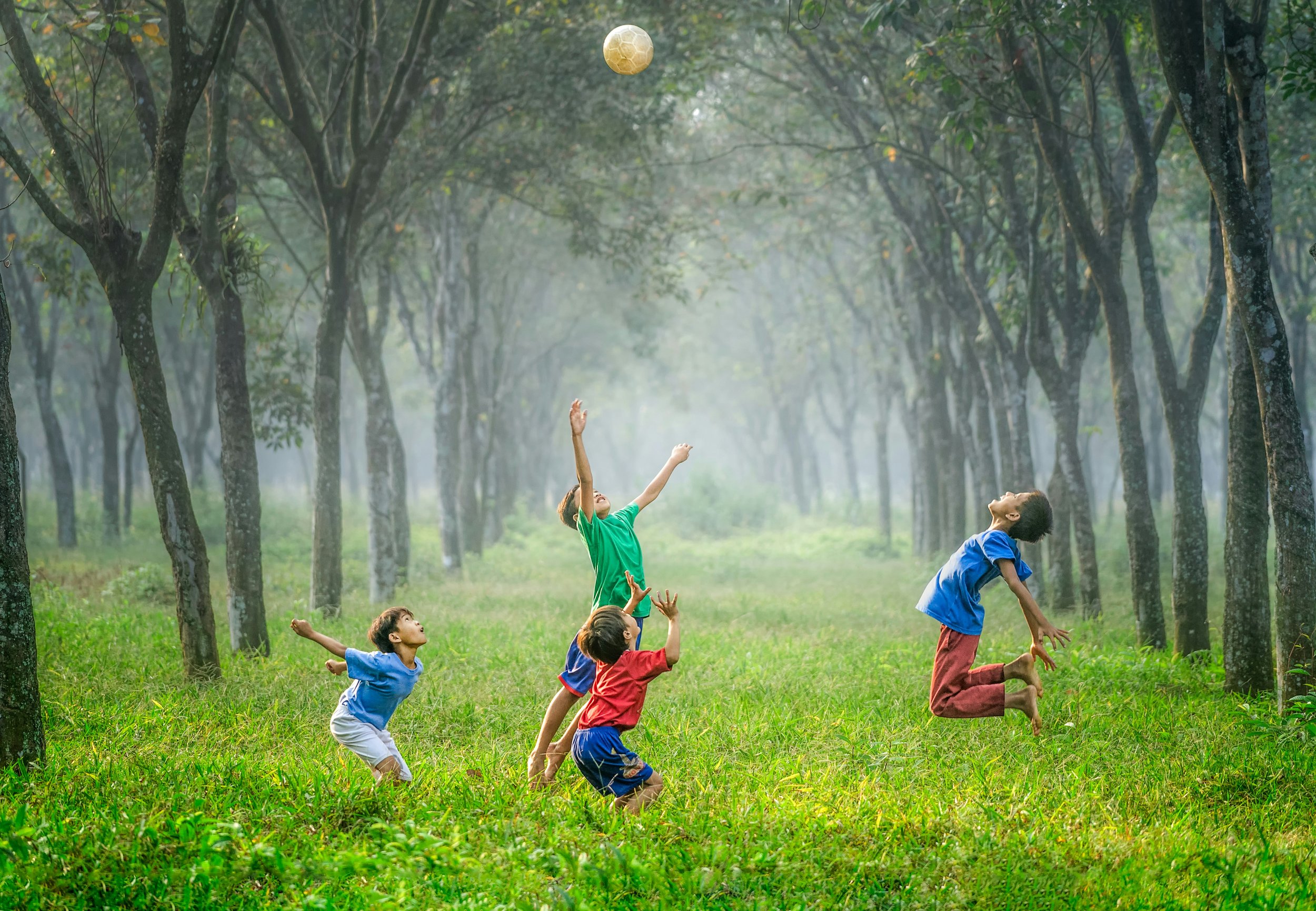Come out and play
Children at play jumping up and down (one of my favorite ways to play!). Photo by Robert Collins on Unsplash
Did you know that people who do Tai Chi or Qigong are called players? You play Tai Chi the way you play a musical instrument and thus perhaps gain mastery over time. Learning to play a musical instrument or learning to play Tai Chi can be enjoyable, or the learning can be stressful if the attitude of play is missing. Enjoying any activity is a sign of being playful. Being playful is a healthy state of mind where enjoyment of an activity reflects on a person’s capacity for joy. Play activities are associated with children, and almost everyone has memories of play from childhood, but it is also true that humans have a capacity for play that extends through adulthood. Professor of Psychiatry, Dr. Stuart Brown made a career of studying play after he studied the lives of imprisoned criminals and mass-murderers whose childhood histories were observed to be markedly “play deprived” compared to control groups. Dr. Brown went on to become the founder of the National Institute for Play , a resource for scholarly research on play. Dr. Brown also wrote a book called Play: How it Shapes the Brain, Opens the Imagination, and Invigorates the Soul that I really appreciated because it spoke to this idea of play playing a role in wellness of the mind and body.
A person who has a naturally playful mind and heart well into adulthood is a precious being. Being playful is a state of mind that encourages health, and playfulness is nearly always potentially present no matter what we are doing. So, I encourage you to find ways to play.
In my own observations, I have noticed that the word play has multiple definitions. I counted 95 in total at Dictionary.com. Among them, there is playing games and making power plays, being played, or that noun of a mechanism having play when there is freedom to move in a fixed space. Play is an amazing word. Play means many things, which seems to indicate that it is an important cultural concept that can appear in many different contexts. I believe the myriad definitions are relevant to the fact that play is an important part of being human.
So, I want to bring to light a few things about play that relate to playing Tai Chi and mindbody arts in general.
Play is Personal
First, play is personal and unique to a person. You can be inspired to play in the presence of people, particular objects, or locations, among other things. A lot of what activates your play memories ties back to the games and activities you did when you played as a child. These are the things that you naturally gravitated to that came from the depths of your little soul and gave you the most joy. For myself, I remember being a child and totally getting lost in skipping from place to place or skipping and jumping rope with others. I pretended to be a horse and always felt light when I skipped and jumped up and down. I felt like I could fly through the street on the way to grandma’s house or coming home from church. Moving my body joyfully in space was (and still is) my favorite way to play!
For others, play may be different. There could be getting lost in books or puzzles, telling stories, rough housing, squealing, dressing up, making people laugh, putting on a show, building forts or other structures, rolling around with the dog, making snowballs or mud pies, and otherwise using the imagination. The hours could go by unnoticed. I remember we could play all day with a box or with the neighbor’s wheelchair, and we would take turns riding the wheelchair down the hill. You get the idea that children can come up with endless ideas. But it is true for adults too!
Play has unique features
Do you recognize play when you see it? Are you open to invitations to play? Play researcher, Peter Gray, describes being in the state of play, which is an attitude more than a behavior. Gray’s article on Substack explores the four characteristics of play, but here they are with a few annotations:
Attraction, as somehow being drawn in (researchers call this self-chosen or self-directed).
Done for its own sake without a purpose or to accomplish anything or get a reward (researchers call this intrinsically motivated), which usually means low stress and relaxation.
Sometimes there are simple rules that are shared with others in social situations, as when playing games.
Imaginative and creative. The rules are the creative constraints where you can move freely.
Playing Tai Chi and Qigong
When you play Tai Chi and Qigong, you do care about the rules while you stay relaxed. You make the movements in sequence as you breathe and move. There is a beginning, a middle, and an end. Staying relaxed brings a sense of curiosity to the endeavor and sparks play and absorption. The simple postural rules can be a set of creative constraints. Sharing the movements and keeping together with others can be a way of making the practice social and engaging. Sometimes the imagination and creativity may be activated when doing the movements as you visualize shadow boxing with life or feel body weight going down to the earth as you encounter benevolent forces. The imagination can be active in your moving meditations. Sometimes creativity is sparked, if not in the moment, then shortly after.
Play as Exploration
It reminded me of a line from a Star Trek episode written by science fiction writer Theodore Sturgeon: “The more complex the mind, the greater the need for the simplicity of play.” Yes, this Star Trek line has stayed with me, and I was delighted that this very line is the title of a scholarly paper by Health Care Ethics professor Jason Eberl, PhD., at Saint Louis University where Eberl refers to Aristotle pointing out that humans, as rational animals, are “not satisfied with mere pleasure seeking, but [are] driven to reflect upon the limitless possibilities of existence.”
Yes, this is what play truly is, and I believe this is why we do it as children—to embrace “the limitless possibilities of existence” as a basic learning strategy early in life. Play can be a way of imitating life, using the imagination, and learning to be honest and fair with others. Play can also be a way to channel emotions, like fear, anger or aggression, and so release energy in the process. Then comes a point when children get serious about life and start pursuing success or survival as adults, sometimes sacrificing the pursuit of play. This is surprisingly easy to do in our culture where we are encouraged to work hard and sacrifice the need for sleep and play. If you have ever experienced burnout, you know what a diminished sense of play is like. Dr. Brown asserts that the opposite of play is not work, but depression. Pursuing play regularly can thus be thought of as a health practice.
Do it just to do it
Yes! Pursuing things, like making art, meditation, Tai Chi, just for the sake of doing them is a form of play in that the sense of accomplishment is not front and center. There is an attitude of being curious about what emerges and what happens. Simply getting lost in the pursuit of an activity like breathing or putting the body in a particular sequence of movements can be a form of play and even joyful devotion and gratitude. As adults we can recapture some of this pursuit of the “limitless possibilities of existence” by playing Tai Chi—stepping out of time or stretching time while doing an activity that has no purpose except in the doing and being of it.
I believe that the Tai Chi and Qigong forms are empty until they are animated (literally brought to life) by a "player" of who "plays" the form step-by-step (note for note as in music). This is about discipline, practice and work, which may lead to virtuosity. But this is not the point of playing Tai Chi and Qigong. Over time the process of cultivation makes a player soft like Lao Tzu's example of a person being able to return to the innocence of experiencing life as a baby (still interested in what life has to offer) especially after experiencing and learning from life’s harshness. Your limbs become pliant and relaxed yet strong. Your heart is resilient. Your breathing is deep, and your face is relaxed. I have seen the wrinkles and lines on foreheads disappear on people deep in the state of play and meditation as they play Tai Chi. The practice yields a fruit that can be experienced as a freedom in a body and mind that can move and be freely in existence. Like a child. This happens over time in my experience, if one practices with humility and sincerity. This lovely freedom can naturally be felt and witnessed as play and playfulness that, like all play, is timeless, free and expanded like the exuberant play of children.


